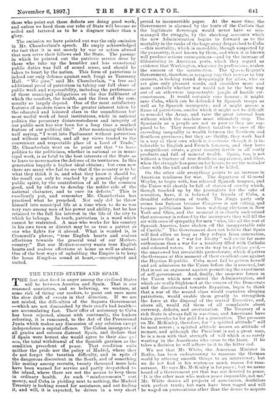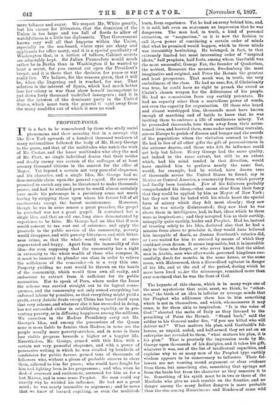THE UNITED STATES AND SPAIN.
THE first shot fired in anger among the civilised States will be between America and Spain. That is our reasoned conviction, and so believing, we venture, at some risk of tiring our readers, to point out once more the slow drift of events in that direction. If we are not misled, the difficulties of the Sagasta Government —which are not diminished by their chief's bad health— are accumulating fast. Their offer of autonomy to Cuba has been rejected, almost with contumely, the leaders referring, it is rumoured, to the Act of the Provisional Junta which makes any discussion of any solution except independence a capital offence. The Cuban insurgents of all grades and colours distrust Spain, and declare that if Spain were honest she would agree to their sine pvi non, the total withdrawal of the Spanish garrison as the condition precedent of peace. That condition suits neither the pride nor the policy of Madrid, where they do not forget the taxation difficulty, and in spite of the dangerous discontent in the South, and of something like mutiny among recruits, twenty thousand more lads have been warned for service and partly despatched to the island, where there are not the means to keep them in ordinary health. As such " reinforcements " cost money, and Cuba is yielding next to nothing, the Madrid Treasury is looking round for assistance, and not finding it, and will, it is expected, be driven in a very short period to inconvertible paper. At the same time, the Government is alarmed by the hints of the Carlists that the legitimate Sovereign would never have so mis- managed the struggle, by the shocking accounts which the new Administration begins to forward as to the mortality in the ranks of the huge army despatched to Cuba —this mortality, which is incredible, though suspected by the peasantry, is not known by them, and when it is known will produce serious consequences—and by the increase of filibustering in American ports, which they regard as evidence that Washington, whatever its professions, wishes the success of the insurrection. The Queen-Regent's Government, therefore, is scraping together Pesetas to buy cruisers, is looking round despairingly for allies, who as yet give only pleasant words, and considers more and more carefully whether war would not be the best way out of an otherwise impenetrable jungle of hostile cir- cumstances. It would certainly save honour ; it might save Cuba, which can be defended by Spanish troops as well as by Spanish insurgents ; and it might arouse a. flame of patriotism, amidst which it might not be difficult to remodel the Army, and raise the great internal loan without which the machine must ultimately stop. The Spaniards as a people are not so poor as they are sup- posed to be. They resent direct taxation bec.iuse of the- exceeding inequality in wealth between the Northern and Southern provinces; but they are thrifty, they work hard in a, way of their own which is tructuous though it is in- tolerable to English and French foremen, and they have a magnificent estate, a great country fertile in all costly products and full of mineral wealth. Spain, too, is not without a tincture of true Southern impatience, and likes, when the struggle has gone on for hours, to see the matador close with the bull and either kill or be killed.
On the other side everything points to an increase in American readiness for war. The departure of General Weyler, to begin with, has released Spanish tongues, and the Union will shortly be full of stories of cruelty which, though touched up by the journalists for the sake of sensation, have, it is believed by friends of Cuba, a. dreadful substratum of truth. The Jingo party only seems less furious because Congress is not sitting, and because politicians have been watching elections in New York and Ohio, and the moment it is clearly understood that autonomy is refused by the insurgents they will fill the air with cries of sympathy for men "who, like all the rest of Spanish America, have shaken off the insupportable rule of Castile." The Government does not believe that Spain will find allies so long as they refrain from annexation, and knows that a " war for liberty" will excite far more enthusiasm than a war for a, territory filled with Catholic and coloured voters. It sees its way to a terlium
the unavowed but irresistible protectorate, which deprives the Germans at this moment of their excellent case against the Haytian Republic. Cuba must fail to govern herself and ask admission to the Union before she is annexed, but that is not an argument against permitting the experiment of self.government. And, finally, the immense forces in the Union which now control the Administration, and which are really frightened at the swerve of the Democrats and the discontented towards Bryanism, begin to think that a war of the second class would reawaken sleeping patriotism, would enable them greatly to strengthen the force at the disposal of the central Executive, and, above all, would rid them of all complaints about currency, deficits, and overtaxation. The Treasury of a. rich State is always full in war-time, and Americans have taken greenbacks for gold for a generation. The pressure on Mr. McKinley, therefore, for "a spirited attitude" will be most severe ; a spirited attitude means an attitude of menace, and although the President is not a great man, he is a man with that strength of will which is so rarely wanting in the Americans who come to the front. If he takes a decision he will adhere to it to the bitter end.
We see that Mr. White, the American Minister in Berlin, has been endeavouring to reassure the German world by uttering smooth things to an interviewer ; but we do not find in his sentences much reason for reas- surance. He says Mr. McKinley is for peace; but we never heard of a Government yet that was not devoted to peace. 'It is the other man who makes peace impossible, not me.' Mr. White denies all projects of annexation, doubtless with perfect truth ; but wars have been waged and will be waged on provocations other than the desire to acquire
more tobacco and sugar. We respect Mr. White greatly, but his excuse for filibusters, that the dominion of the Union is too large and too full of fiords to allow of watchfulness, is a little too diplomatic. That Government knows very well all that happens within the Union, especially on the sea-board, where eyes are sharp and applicants for office many, and it is a special peculiarity of Washington that, in a nation of talkers, Cabinet secrets are admirably kept. Sir Julian Pauncefote would much rather be in Berlin than in Washington if he wanted to hunt a secret, for you cannot cut open the President's breast, and it is there that the decision for peace or war really lies. We believe, for the reasons given, that it will be, when the lingering end is reached, for war. That solution is the interest of Spain, which had much better lose her colony in war than show herself incompetent to put down forty thousand undrilled insurgents ; and it is also the interest of the dominant party in the United States, which must turn the general ti tight away from the many muddles out of which it sees no road.























































 Previous page
Previous page